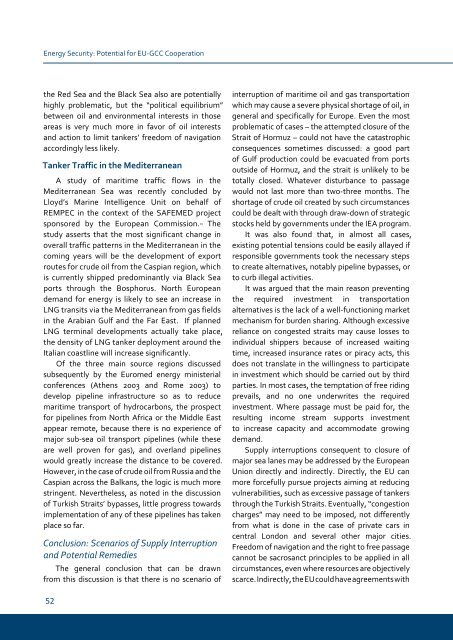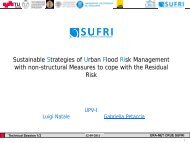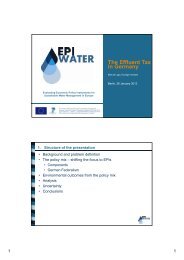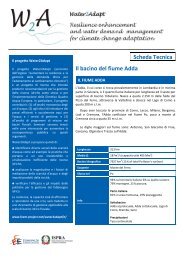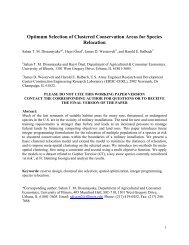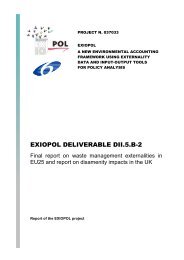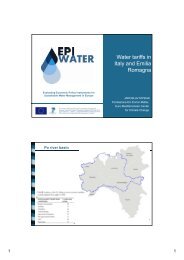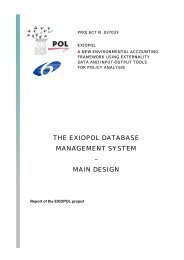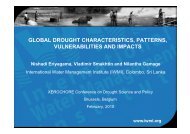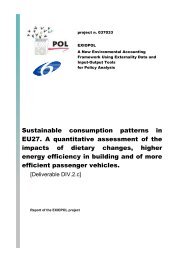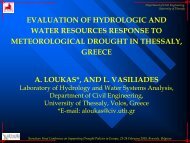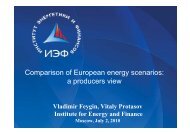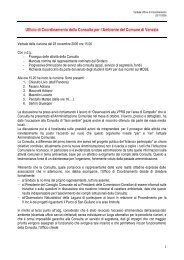Gulf and European Energy Supply Security - Feem-project.net
Gulf and European Energy Supply Security - Feem-project.net
Gulf and European Energy Supply Security - Feem-project.net
You also want an ePaper? Increase the reach of your titles
YUMPU automatically turns print PDFs into web optimized ePapers that Google loves.
<strong>Energy</strong> <strong>Security</strong>: Potential for EU-GCC Cooperation<br />
the Red Sea <strong>and</strong> the Black Sea also are potentially<br />
highly problematic, but the “political equilibrium”<br />
between oil <strong>and</strong> environmental interests in those<br />
areas is very much more in favor of oil interests<br />
<strong>and</strong> action to limit tankers’ freedom of navigation<br />
accordingly less likely.<br />
tanker traffic in the Mediterranean<br />
A study of maritime traffic flows in the<br />
Mediterranean Sea was recently concluded by<br />
Lloyd’s Marine Intelligence Unit on behalf of<br />
REMPEC in the context of the SAFEMED <strong>project</strong><br />
sponsored by the <strong>European</strong> Commission. 13 The<br />
study asserts that the most significant change in<br />
overall traffic patterns in the Mediterranean in the<br />
coming years will be the development of export<br />
routes for crude oil from the Caspian region, which<br />
is currently shipped predominantly via Black Sea<br />
ports through the Bosphorus. North <strong>European</strong><br />
dem<strong>and</strong> for energy is likely to see an increase in<br />
LNG transits via the Mediterranean from gas fields<br />
in the Arabian <strong>Gulf</strong> <strong>and</strong> the Far East. If planned<br />
LNG terminal developments actually take place,<br />
the density of LNG tanker deployment around the<br />
Italian coastline will increase significantly.<br />
Of the three main source regions discussed<br />
subsequently by the Euromed energy ministerial<br />
conferences (Athens 2003 <strong>and</strong> Rome 2003) to<br />
develop pipeline infrastructure so as to reduce<br />
maritime transport of hydrocarbons, the prospect<br />
for pipelines from North Africa or the Middle East<br />
appear remote, because there is no experience of<br />
major sub-sea oil transport pipelines (while these<br />
are well proven for gas), <strong>and</strong> overl<strong>and</strong> pipelines<br />
would greatly increase the distance to be covered.<br />
However, in the case of crude oil from Russia <strong>and</strong> the<br />
Caspian across the Balkans, the logic is much more<br />
stringent. Nevertheless, as noted in the discussion<br />
of Turkish Straits’ bypasses, little progress towards<br />
implementation of any of these pipelines has taken<br />
place so far.<br />
Conclusion: Scenarios of <strong>Supply</strong> Interruption<br />
<strong>and</strong> Potential Remedies<br />
The general conclusion that can be drawn<br />
from this discussion is that there is no scenario of<br />
2<br />
interruption of maritime oil <strong>and</strong> gas transportation<br />
which may cause a severe physical shortage of oil, in<br />
general <strong>and</strong> specifically for Europe. Even the most<br />
problematic of cases – the attempted closure of the<br />
Strait of Hormuz – could not have the catastrophic<br />
consequences sometimes discussed: a good part<br />
of <strong>Gulf</strong> production could be evacuated from ports<br />
outside of Hormuz, <strong>and</strong> the strait is unlikely to be<br />
totally closed. Whatever disturbance to passage<br />
would not last more than two-three months. The<br />
shortage of crude oil created by such circumstances<br />
could be dealt with through draw-down of strategic<br />
stocks held by governments under the IEA program.<br />
It was also found that, in almost all cases,<br />
existing potential tensions could be easily allayed if<br />
responsible governments took the necessary steps<br />
to create alternatives, notably pipeline bypasses, or<br />
to curb illegal activities.<br />
It was argued that the main reason preventing<br />
the required investment in transportation<br />
alternatives is the lack of a well-functioning market<br />
mechanism for burden sharing. Although excessive<br />
reliance on congested straits may cause losses to<br />
individual shippers because of increased waiting<br />
time, increased insurance rates or piracy acts, this<br />
does not translate in the willingness to participate<br />
in investment which should be carried out by third<br />
parties. In most cases, the temptation of free riding<br />
prevails, <strong>and</strong> no one underwrites the required<br />
investment. Where passage must be paid for, the<br />
resulting income stream supports investment<br />
to increase capacity <strong>and</strong> accommodate growing<br />
dem<strong>and</strong>.<br />
<strong>Supply</strong> interruptions consequent to closure of<br />
major sea lanes may be addressed by the <strong>European</strong><br />
Union directly <strong>and</strong> indirectly. Directly, the EU can<br />
more forcefully pursue <strong>project</strong>s aiming at reducing<br />
vulnerabilities, such as excessive passage of tankers<br />
through the Turkish Straits. Eventually, “congestion<br />
charges” may need to be imposed, not differently<br />
from what is done in the case of private cars in<br />
central London <strong>and</strong> several other major cities.<br />
Freedom of navigation <strong>and</strong> the right to free passage<br />
cannot be sacrosanct principles to be applied in all<br />
circumstances, even where resources are objectively<br />
scarce. Indirectly, the EU could have agreements with


